- Home
- John Bellairs
The Dark Secret of Weatherend
The Dark Secret of Weatherend Read online
THE DARK SECRET OF WEATHEREND
by John Bellairs
cover and illustrations by Edward Gorey
digital preservation by Guy Montag
CHAPTER ONE
On a hilly winding road in rural Minnesota, a boy named Anthony Monday was pedaling furiously on a bicycle. The year was 1954, and it was August, and it was broiling hot. Anthony was fourteen years old, with a thin, pinched face, and a long pointed nose. He was tall, skinny, and muscular, and today he was wearing cutoff jeans and sneakers and an old soiled white T-shirt. He was also wearing a red leather cap with a scrunched peak. Anthony had a thing about red leather caps. He wore them summer and winter, in good weather and bad. And when one wore out, he got another exactly like it and scrunched the peak until it looked right. Anthony was going out to see his best friend, an elderly lady named Miss Eells. They had met one day in a drugstore in Hoosac, the industrial town on the Mississippi River where Anthony lived, and they had gotten to be friends in a hurry. Now Anthony had an after-school job as a page at the Hoosac Public Library, which he had gotten through Miss Eells, who was the head librarian. Anthony liked Miss Eells because she was fun to be around. They played chess and Scrabble and went places together. Also Miss Eells listened to Anthony. He could tell her his troubles and his secrets and know that she would not blab about him to anybody else. On this particular day, however, he was not burdened with any secrets that needed to be told. He was just going out to see Miss Eells for fun. She was working at a branch library in the tiny town of Rolling Stone, which was three miles from Hoosac. But three miles is not far to go when you are young and strong, and Anthony was whizzing along at a pretty good clip. Bits of gravel snapped from under his bike's tires as he went, making a sound like popcorn popping. On Anthony rode, legs pumping, singing a song.
Meanwhile, out in Rolling Stone, Miss Eells was in a rotten mood. She was on the lawn behind the little library building, swinging a golf club. It was a nine iron, and she swung it viciously and wildly. As she flailed away, clods of grassy earth flew into the air. The lawn was full of holes where Miss Eells had dug divots, and it was hard to tell whether she was trying to hit the celluloid practice ball or just trying to destroy the lawn. Miss Eells was a small, birdlike woman with a wild nest of white hair on her head. She was sixty-eight years old and wore glasses, but behind them her bright eyes were lively and inquisitive. Normally she was cheerful, but right now she was angry, frustrated, and bored because she was stuck managing the branch library for the summer in this tiny hick town where nothing ever happened. It was true that the library building was quite charming. It was made of red brick and was only one story high, with green shutters and flower boxes under the windows. But all the charming buildings in the world would not have made Miss Eells feel any better about Rolling Stone.
So why was she out here instead of in Hoosac, where she wanted to be? Well, it was all Mrs. Oxenstern's fault.
Mrs. Hanson Oxenstern was the head of the Library Board and a very important person in the city of Hoosac. Miss Eells had never been friendly with Mrs. Oxenstern, but for a long time she had tried to fight down her dislike of the other woman. Then one day Mrs. Oxenstern decided that it would be nice to turn the Children's Room on the second floor of the library into a Genealogy Room. Genealogy is the study of family trees and ancestors, and it can be fascinating if you like that sort of thing. Miss Eells felt that Genealogy was about as interesting and important as bottle cap collecting. A long and bitter argument ensued, in which Miss Eells told Mrs. Oxenstern that she was a stupid, pompous busybody who liked to throw her weight around. Mrs. Oxenstern was furious. She stormed out of Miss Eells's office and slammed the door behind her. Mrs. Oxenstern was pretty powerful, and she would have fired Miss Eells if she could have. But luckily Miss Eells had been at the Hoosac Library for a long time, and she had tenure. All Mrs. Oxenstern could do was force Miss Eells to fill in at the branch libraries around Hoosac if there was an emergency. Of course one day just such an emergency arose. It was the beginning of the summer and old Mrs. Trombly of the Rolling Stone branch was so sick she had to be hospitalized. In no time Mrs. Oxenstern had happily sent Miss Eells over to take her place. So here Miss Eells was, bored silly and angry a lot of the time.
Miss Eells stopped swinging the golf club and looked around. She felt ashamed of herself. Normally she was not the destructive type—not intentionally, anyway. She was kind of clumsy, and she was always spilling things or knocking vases off tables. But she tried hard to be tidy. Now, as she looked around, she realized that she had been taking out her anger and frustration on the lawn. Sighing, she threw down the club and walked around to the front of the library. She felt sweaty, so she took a handkerchief out of the pocket of her skirt and wiped her face. Then she folded her arms and looked around in a discontented way. The library stood at a place where two country roads crossed. Off to the left, at the top of a low bank, was the Spanish-American War monument: a tall granite shaft with some names on it, and two grim old black cannons. Across the street was a variety store, and next to it stood a dignified white frame house with four tall brick chimneys. It was a very picturesque scene, but there was not a soul stirring anywhere. It was three in the afternoon, and there was nobody—absolutely nobody—at the library but Miss Eells. She was so bored that she felt like crying. Oh, please, God, let something happen soon! she said to herself. And then—as if in answer to her prayer—around the corner in a cloud of dust came Anthony.
"Anthony! Anthony! Hi! How are you?" Calling out and waving like a madwoman, Miss Eells ran pell-mell across the grass. Anthony swerved his bike off the road. He coasted along the driveway for a short distance, and then he hit the brakes, vaulted nimbly to the ground, and walked his bike the rest of the way to where Miss Eells was standing.
"Hi, Miss Eells!" he said, grinning cheerfully. "I had the day off today, so I thought I'd come out and see you. How're you doin', huh?"
Miss Eells made a sour face. "Don't ask! Actually, if you want to know, I'm bored out of my ever-loving mind! About three people a day come in to use this stupid little library, plus one or two tourists who need to use the bathroom. Thank God you stopped by! I think that in another hour I would have been pitching rocks at passing cars. Come on inside, and I'll get you a Coke."
Anthony followed Miss Eells into the tiny library. It was hot and stuffy inside, even though all the windows were open. A small fan was whirring noisily on top of a filing cabinet, but it didn't seem to help much. There were only two rooms here: a long one full of books on steel shelves, and the disorderly little office where Miss Eells's desk was. Books and papers were strewn everywhere, and there were Coke stains and tea stains and coffee stains all over—on the desk blotter, on the papers, on the floors, and even on the walls. Miss Eells had had a few accidents.
"Welcome to the hermit's cave," said Miss Eells sourly. She swept dust off a chair with her hand and told Anthony to sit down. Then she went over into a dark corner where a small, ancient refrigerator was humming quietly. She opened it, took out two bottles of Coke, and brought them over to the drainboard of a built-in sink that stood by the window. Humming pleasantly, Miss Eells reached into a drawer, took out a bottle opener, and started to pry the cap off one of the Coke bottles. Suddenly she let out a bloodcurdling yelp. The opener clattered to the drainboard. Clutching at her injured hand, Miss Eells rushed past Anthony and made a beeline for the bathroom. The bathroom door slammed, and from behind it Anthony heard the sound of running water. A few minutes later Miss Eells came back. On the index finger of her right hand was a bloodstained Band-Aid.
"There are certain things," she said with a despairing sigh, "which were not meant to be, Anthony. We
were not meant to have ice-cold Coke today. So why don't we climb into my car and take a drive in the country? It'll cool us off, and then we can get really cool by having an ice cream at the Blue Moon ice cream stand down in Dresbach. How does that grab you?"
Anthony said that it sounded like a good idea. He went outside to lock up his bike behind the library. When he walked back around front he found Miss Eells sitting in her fourteen-year-old Dodge with the motor idling. The car was mud-spattered and covered with rust spots, and it had a bent coat hanger for a radio antenna. Miss Eells had driven it over 204,000 miles, but since it still started every morning, she saw no reason to buy a new one.
"Okay, now," said Miss Eells, waving cheerfully from the open car window. "Let's make ourselves scarce! The library isn't supposed to close for another hour, so if any of Mrs. Oxenstern's spies are hiding in the drainpipes or in the tall grass, I guess I've had it. But at this point I could care less. Come on! Move it or lose it, as my father used to say!"
Anthony climbed in, and they were off. For miles and miles they drove along winding, rutty, bumpy back roads. The air that rushed in through the open windows was like an evening breeze off the sea. As they cruised along, Anthony tilted his head back, eyes closed, and said "Aaah!" several times. Miss Eells began to whistle. She was a great whistler, and she did a medley of songs that had been popular in the forties, like Racing with the Moon, The Victory Polka, and Mairzie Doats. Uphill and downhill, over a railroad grade crossing and through a sleepy country town, they went. Anthony felt very relaxed—he even took off his red leather cap and let the air whip through his matted, sweaty hair. Soon he was drifting off into a pleasant afternoon snooze, until the car slowed down and rolled to a halt.
Anthony blinked and sat up. He looked around. They had pulled off onto the sandy shoulder of a two-lane blacktop that wound among steep hills. On their right the ground fell away. Anthony saw a long, sloping pasture where cows were lazily munching grass. On the left a saggy wire fence ran along the roadside. Beyond it a fairly steep hill rose up to the skyline. Atop the hill stood a gray stone building with pinnacles on the roof. Anthony was bewildered and annoyed. Why on earth had Miss Eells stopped here?
He turned to look at her. She sat with her hands on the steering wheel, gazing dreamily up at the building on the hill.
"I bet you're wondering why we've stopped," she said without turning. "Well, I wanted to show you Weatherend. That's the name of that estate up there. It's all done in fake Gothic, with fancy pointed arches and pinnacles and ball-flowers. There are fountains and funny courtyards with statues on columns, and I would give my left ear to own the place. It's totally deserted now. Nobody's lived in it for the last forty years. What do you think? Hmmm?"
Anthony didn't know. His head was still full of cobwebs. All around them the landscape dreamed in the simmering heat of the August afternoon. Now that the car had stopped, Anthony was beginning to feel sticky and uncomfortable. Rivulets of sweat were running down his back. What was there to look at? Some old run-down building on a hill? Anthony wanted to get moving again, so they could get to the ice cream stand before it closed.
"Yeah, it's nice," he muttered, and he threw a bored glance toward the far-off gray building. He wanted to add "Let's hit the road, okay?" but he knew that would not be very polite. Tensely he waited for Miss Eells to start the car again.
But she didn't. As Anthony watched curiously she opened the car door and leaped nimbly out. Quickly Miss Eells trotted across the road and stopped in front of the sagging fence, which had two large red No Trespassing signs attached to it. Then she darted back, jumped into the car again, and took off her shoes. As Anthony watched, dumbfounded, Miss Eells reached into the backseat and came up with a pair of white sweat socks and two battered tennis shoes. She slipped the socks on over her nylons and then started pulling on the tennis shoes.
Anthony couldn't stand this any longer. At last he spoke. "Miss Eells," he said in an impatient voice, "what the heck is going on? Are you gonna go on a hike or something?"
Miss Eells grinned and leered at Anthony. "Correction! We are going on a hike! Unless of course you want to sit in the car and fester."
Anthony felt helpless. He knew Miss Eells pretty well.
She could be klutzy, she could be vague, she could seem helpless and dithery, but when she really wanted to do something, she was like a runaway locomotive. He felt that he'd better go along. In any case it would be better than waiting in the boiling-hot car.
So Anthony and Miss Eells climbed out and crossed the road. Anthony thought about the No Trespassing signs, and he almost laughed. He had been on hikes with Miss Eells in the past, and he knew that signs like that were like a red cape waved in front of a bull. He had even seen her tear one down once and trample on it. Miss Eells had funny views on a lot of subjects, and on the subject of private property she was practically a socialist.
Miss Eells swung herself quickly over the fence, and Anthony followed. They started up the hill, but as they climbed, Anthony could feel cold fear creeping over his body. What if there were stray dogs lurking? At one time Anthony had liked dogs. If some mutt came ambling up to him, he would pet it and rub its muzzle. But then Anthony had a strange and frightening experience. A stray came after him late one night, barking furiously. Anthony panicked. He started running, tripped over a stone, and broke his arm. Now whenever he was in a lonely place, day or night, an unreasonable fear of dogs would steal over him. In his mind's eye he would see the evil beasts leaping up out of unexpected places, snarling and yelping, with bared fangs and saliva dripping from their mouths, Anthony began to glance nervously to his right and to his left. He was ashamed of his fear and fought against it, but he couldn't do anything to make it go away.
On they climbed. Now they were at the top of the hill. The building that they had seen from the road turned out to be a gray Gothic garage. It was like a miniature church, with quatrefoils and buttresses and narrow pointed windows. In the distance, on a hill that was a little higher than the one they were standing on, loomed the mansion of Weatherend. It was Gothic too, with a gray stone tower and a rose window and knobby, pointed decorations everywhere. But the windows were boarded, and the stone urns that stood on the terrace had been turned upside down. Everywhere the grass was long, rank, and full of weeds. Down in the shallow valley between the two hills Anthony could see a flight of cracked stone steps leading up to a neglected overgrown garden. Two headless sphinxes guarded the top of the stairs, and there were broken marble statues, overturned mossy benches, and weeds galore.
Miss Eells waved her arm at the scene. "See? Isn't this interesting? Wasn't it worth the climb, even in this filthy heat?"
Anthony nodded. He thought the place looked like the setting for a murder mystery. Anthony was reading mysteries now: John Dickson Carr and Agatha Christie and Sir Arthur Conan Doyle. If this were a murder mystery now, he thought, there would be a body down in that garden. Somebody with his head bashed in, or a knife in his back. But life wasn't like mystery novels. There weren't any bodies. There was just the heat and the buzzing of flies and the feeling of loneliness that you get from looking at abandoned houses.
Finally Anthony broke the silence. "Who lived here, Miss Eells? He must've been pretty rich, don't you think?"
"Pretty rich, and pretty weird," agreed Miss Eells. "J. K. Borkman made his money from mining in the Iron Range up north of here, and when he settled down in this place at the age of seventy-two, he decided that he wanted to do two things: First he wanted to live the rest of his life in splendid isolation. Second he wanted to study the weather."
Anthony was startled. "The weather?"
Miss Eells nodded firmly. "The weather. I know it sounds ridiculous, but some people are like that. I had an aunt who was nutty about the weather. She would check the weather reports in the newspapers twice a day, and she was always listening to the weather news on the radio. Well, Borkman was just the same. He filled his house with barometers and barograph
s and thermometers, and there was one of those whirly-cup things on the roof that measured wind speed. And if you ask me why old Borkman had this nutty obsession, I'd have to say that I don't know. In my aunt's case it was probably just something to do to keep from going bananas with boredom." Miss Eells sighed and gazed around. "It's a shame somebody doesn't buy this place and do something with it. You'd think the National Trust for Historical Preservation would be interested in it, but they aren't. And there aren't many millionaires who want to live in rural Minnesota. So the old place just sits and rots. I've come up here a few times to prowl, and I've never seen a soul. What do you suppose is in this rather pretentious garage, eh? Shall we have a peek?"
Anthony turned and looked at the stout, nail-studded wooden doors of the garage. He saw two twisty wrought-iron door handles held together by a chain that was fastened with a large and very rusty padlock. "But the door's locked," he said.
"I wonder if that's true," said Miss Eells thoughtfully. As Anthony watched, Miss Eells walked up to the door and yanked at the padlock. Flakes of rust showered down, and the lock sprang open. Grinning mischievously, Miss Eells removed the padlock. She threw it contemptuously into the weeds, and with a grand flourish whipped off the chain. Unfortunately the flourish was a bit too dramatic, and the end of the chain whirled around and hit Miss Eells on the back of her neck.
"Ow!" she yelled. "Why me, I ask? Why do these things happen to me?" She sighed and looked down at the chain in her hand. "Ah, well," she said wearily, "it's probably just a judgment on me because I'm a nosy old bat. Come on, Anthony. Let's see what's inside."
And with that. Miss Eells dropped the chain and tugged at one of the garage doors. Anthony grabbed the other door handle and pulled. With a dismal groaning sound the doors shuddered open. In addition to the shut-up, musty smell that drifted out there was an odd, clammy chill to the air, even on this hot day. Inside everything was thickly coated with dust and dirt, and cobwebs festooned the grimy windows. It was so dark that it took Anthony's eyes a few seconds to get used to it. Gradually, though, he began to see things. Flowerpots were stacked in one corner, and nearby were old gardening tools, rakes and hoes, and a hand-powered lawn mower. There was a sagging table with more flowerpots on it, plus some trowels and a pair of stiff, dirty gardening gloves.

 The Curse of the Blue Figurine
The Curse of the Blue Figurine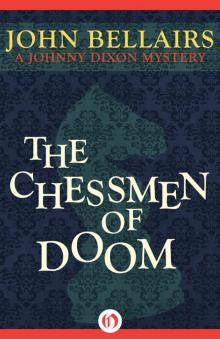 Chessmen of Doom
Chessmen of Doom Secret of the Underground Room
Secret of the Underground Room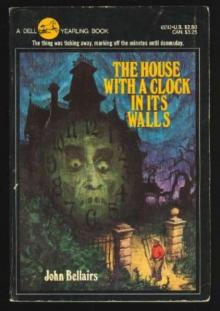 The House With a Clock in Its Walls
The House With a Clock in Its Walls The Vengeance of the Witch-Finder
The Vengeance of the Witch-Finder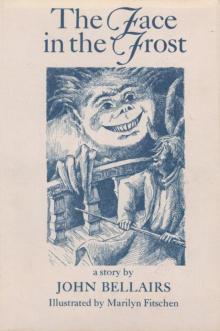 The Face in the Frost
The Face in the Frost Revenge of the Wizard's Ghost
Revenge of the Wizard's Ghost Spell of the Sorcerer's Skull
Spell of the Sorcerer's Skull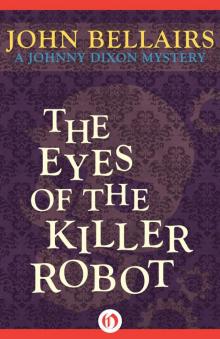 Eyes of the Killer Robot
Eyes of the Killer Robot Mummy, the Will, and the Crypt
Mummy, the Will, and the Crypt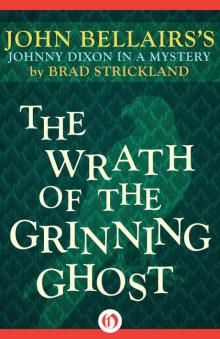 Wrath of the Grinning Ghost
Wrath of the Grinning Ghost The Mansion in the Mist
The Mansion in the Mist The Doom of the Haunted Opera
The Doom of the Haunted Opera The Bell, the Book, and the Spellbinder
The Bell, the Book, and the Spellbinder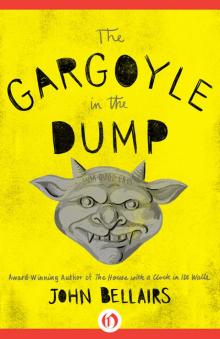 The Gargoyle in the Dump
The Gargoyle in the Dump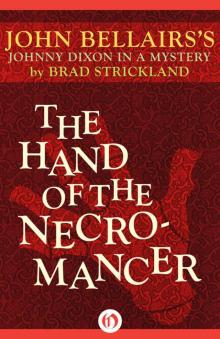 The Hand of the Necromancer
The Hand of the Necromancer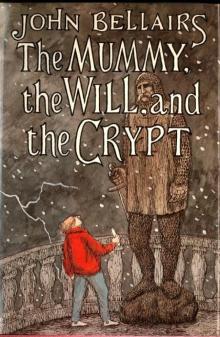 The Mummy, the Will, and the Crypt
The Mummy, the Will, and the Crypt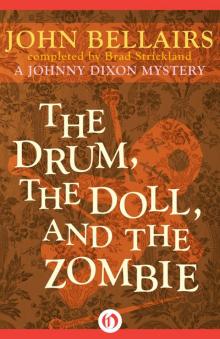 Drum, the Doll, and the Zombie
Drum, the Doll, and the Zombie The Specter from the Magician's Museum
The Specter from the Magician's Museum The Letter, the Witch, and the Ring
The Letter, the Witch, and the Ring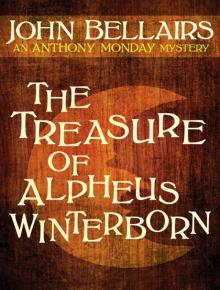 The Treasure of Alpheus Winterborn
The Treasure of Alpheus Winterborn The Dark Secret of Weatherend
The Dark Secret of Weatherend The Figure in the Shadows
The Figure in the Shadows